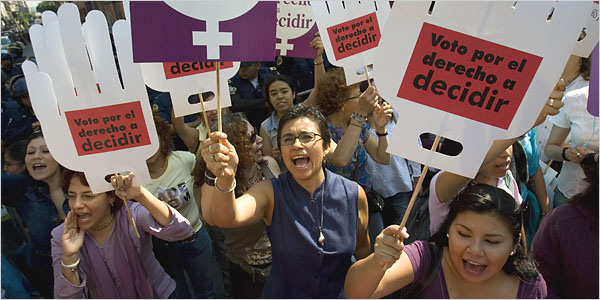
|  |  |  News Around the Republic of Mexico | September 2008 News Around the Republic of Mexico | September 2008  
Mexico's Battle Over Legal Abortion Heats Up
 Olga R. Rodriguez - Associated Press Olga R. Rodriguez - Associated Press
go to original


| | Pro-abortion activists demonstrated before April's watershed vote by Mexico Citys legislature. (Eduardo Verdugo/Associated Press) | | |
When Mexico's Supreme Court upheld the capital's abortion law last week, it set a precedent that could affect the rest of the country and other Latin American cities.

Mexico City is one of the few places in Latin America that allows abortion without limitations in the first trimester, although abortion rights groups complain most doctors still refuse to perform the procedure.

Within minutes of Thursday's 8-3 vote in favor of the law, abortion rights groups were thinking of ways to expand the decision to other parts of Mexico and even Latin America, where abortion is virtually unheard of.

"It opens the road for all of Latin America to start visualizing legal paths to abortion," said Raffaella Schiavon, who directs the international abortion rights group Ipas and has been advising the city government.

Mexico City officials said they were preparing to help other local governments in the region interested in approving similar laws.

Elsewhere in Mexico, abortion is allowed only in cases of rape, when the mother's life is in danger or if the fetus has severe deformities. That is standard across Latin America, where only Cuba and Guyana allow abortions without restrictions in the first trimester. Nicaragua banned abortion in all cases in 2006.

Anti-abortion groups were mobilizing to fight other local attempts to legalize abortion.

"This tragedy we are living in Mexico City is going to spread to other states," said Jorge Serrano, director of the anti-abortion group Pro-Vida.

Supreme Court Justice Margarita Luna said the ruling opened the possibility of other similar laws in Mexico.

"This decision was in regard to Mexico City's Legislative Assembly, but in the end it establishes a precedent that can be applied to other local lawmaking bodies," she said.

The issue will still be a battleground. Conservative President Felipe Calderon, whose administration appealed the Mexico City law to the Supreme Court, will likely continue fighting efforts to expand the availability of abortions.

Under the law, all Mexico City public hospitals must give their patients free abortions, but doctors under the public system also have the right to refuse to carry out the procedure. Private hospitals are not obliged to give abortions, but can without facing penalty.

Even with the Supreme Court's approval, abortion rights groups complain many doctors refuse to do the procedure in Mexico City. Some are morally opposed, while others fear public scorn or the wrath of the country's powerful Roman Catholic Church.

The church blasted the court on Thursday, declaring itself in mourning and issuing a statement that church leaders would redouble their efforts to campaign on behalf of "the millions of children who are being sacrificed."

About a dozen riot police blocked off the street leading to the court as the decision was announced, but no major protests materialized.

Leftist Mexico City Mayor Marcelo Ebrard called the ruling "a triumph of reason over prejudice."

In April 2007, his government legalized abortions in the first 12 weeks of pregnancy. But the federal Attorney General's Office and National Human Rights Commission took the law to the Supreme Court a month later, arguing the city can't make health laws.

Justice Guillermo Ortiz said Thursday's ruling simply found it was constitutional for Mexico City to legalize abortion.

"It's not up to the Supreme Court to legalize or criminalize abortion," he said.

Abortions continued, despite the appeal, with 12,700 women seeking them at 14 Mexico City hospitals since the law passed, according to city health officials. Still, that was less than half the 27,000 women who asked for information about the free abortions, they said.

Ms. Schiavon said 20 percent of the women who underwent abortions were Mexicans who live outside the capital.

Before the law, many women in Mexico who wanted to terminate a pregnancy would drink an herbal tea designed to induce abortion or seek out someone who could carry out a crude, home version of the procedure.

While many doctors refuse to perform abortions, Ms. Schiavon said the city has tried to make the procedure accessible by creating a hot line for women and opening counseling centers in hospitals.

Dr. Francisco Hernandez, who has been a gynecologist in Mexico City for 52 years, said he's been asked five times to perform an abortion, but refused. "Abortion is murder, and I'm not a murderer," he said.

At a Mexico City abortion clinic Thursday, officials refused to talk to the press, and two security guards stood at the door. No one appeared to be going in or out of the clinic for an abortion, but a long line of people, mainly women, waited to collect government vouchers being distributed there for free school supplies for their children.

Nearby, two protesters set up a framed picture of the Virgin of Guadalupe and invited people to pray with them to stop abortion.

Brenda Velez, 38, said she visits the clinic four times a week to recite the rosary.

"They are just encouraging women to be dirty and loose," she said. "The justices' decision is only going to spread more irresponsible behavior." |

 |
|  |



